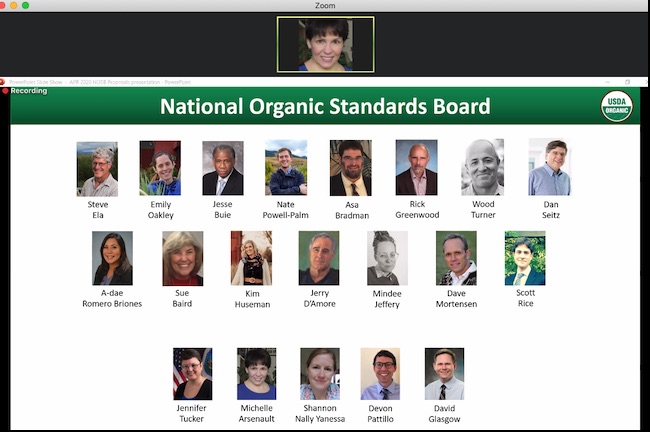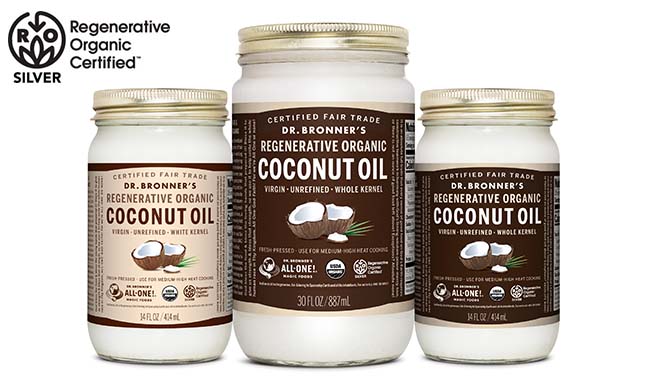
The USDA Asserts Total Power over the Organic Industry’s Agenda
At last week’s National Organic Standard Board meeting, which was held online for the first time ever, the USDA sent an unmistakable and disconcerting message to all industry stakeholders.
We are in charge, and we will decide the agenda of this industry — not you.
This became very clear at the beginning of the meeting when a few National Organic Standard Board (NOSB) members wanted to bring up matters related to hydroponics, arguably the most controversial subject in the entire organic industry. Jennifer Tucker, Deputy Administrator of the Agricultural Marketing Service – National Organic Program at the USDA, flatly refused.
This was not even going to be up for discussion, she said. Only when the courts make a decision related to hydroponics, as per the Center for Food Safety’s lawsuit against the USDA, would appropriate action be taken.
“The USDA does not want people talking about hydroponics anymore, and it is maddening,” said one NOSB member who requested anonymity. “We have brought up issues that we want to address and have been told that ‘we won’t be doing that.’ Not only is it disheartening and disempowering, but it has become harder to stay engaged in a substantive way.”
According to section §6518(a) of the Organic Foods Production Act of 1990 (OFPA), ratified by Congress, the National Organic Standards Board is a 15-member advisory panel “to assist in the development of standards for substances to be used in organic production and to advise the USDA Secretary on any other aspects of the implementation of this chapter.”
While the USDA is not legally obligated to enact its recommendations, the original intent and spirit of the NOSB is that the board would serve as an expert panel to guide the decision-making of the agency. However, nowhere in OFPA does it state the Deputy Administrator of the National Organic Program (NOP) can control the work agenda.
This small but very significant detail can be found in Section 8 of the NOSB’s charter. It says:
NOSB and subcommittee work agendas are developed in coordination with the NOSB and approved by the NOP Deputy Administrator.
The Federal Advisory Committee Act (FACA) requires advisory committees, of which the NOSB is one, to have an official charter prior to meeting or taking any action. The NOSB charter is renewed every two years as a requirement of FACA, and the last charter was filed on May 4, 2018. However, unlike most FACA advisory bodies, the NOSB was created by Congress, not the regulatory agency, and the law says that the Secretary “shall” consult the body in implementing the act.
So, if the NOSB wants to take back full control over its agenda — an absolute imperative — it can do so by changing the language in Section 8 of the charter when it comes up for renewal this year.
Easier said than done.
Based on the published agenda from the April 2018 NOSB meeting in Tucson, Arizona and a full review of the published transcripts from that meeting, the NOSB did not vote on the renewed charter. The record suggests that the USDA filed the charter without taking a vote or publicly discussing it with the organic community, including NOSB members.
In 2014, over 20 groups filed a petition with USDA Secretary Tom Vilsack when his agency made unilateral changes to the charter that (1) gave the USDA the ability to potentially terminate the NOSB and (b) changed the statutory responsibility of the NOSB as approved by OFPA.
So, in order to strip this ‘NOP Deputy Administrator language’ from Section 8 of the charter, the industry would seemingly need to file another legal petition with the USDA Secretary, something sure to fall on deaf ears given this administration’s sentiments toward the National Organic Program.
Because of this language in the charter, the NOSB is unable to freely and fully “assist in the development of standards for substances to be used in organic production and to advise the USDA Secretary on any other aspects of the implementation of this chapter” since it cannot set its own work agenda. But the charter cannot supersede an act of the legislative branch.
Quite simply, the USDA has subverted the statutory mandate of Congress — a deflating prospect to both industry stakeholders who are seeking to safeguard organic standards and to NOSB members who invest endless amounts of voluntary work into this board.
“USDA usurping the power of the NOSB, after over two decades of precedent, did not happen spontaneously,” said Mark Kastel, Director of OrganicEye, the investigative arm of Beyond Pesticides. “We need members of the NOSB to step up and exert their legal control over the rulemaking process and preserve the public-private collaboration that Congress had intended.”
According to an email from a USDA spokesperson received this morning, “the charter renewal (for 2020) is in process and will be in place soon.”
Organic Insider reached out to a few current NOSB members today, and none of them had any knowledge of the renewal of the charter.
 |
With gratitude, 
Max Goldberg, Founder |
Quick Hits
* An absolutely gorgeous short-video called Biodynamic Agriculture: Farming in Service of Life from Kiss the Ground.
* Mykonos Hotel, opening in July, is the first vegan organic hotel in Greece. Looks amazing!
* The J.E.D.I (Justice, Equity, Diversity and Inclusion) Collaborative™, the latest natural products industry project from OSC2, is a platform for action to embed J.E.D.I into the natural products ecosystem. The virtual Leadership launch event last week included an in-depth look at the what, why and how of J.E.D.I Collaborative from the co-founders and J.E.D.I expert partners, as well as a keynote speech by bestselling author Ijeoma Oluo.
* TV personality Nick Cannon is opening The VTree Hollywood, an organic plant-based restaurant in Los Angeles.
* Read about these inspirational young entrepreneurs, the winners of the Whole Kids Foundation’s #WholeKidsBiz sweepstakes.
* Kathleen Delate and Chris Currey, horticulture professors at Iowa State University, have released another video — Gardening While Isolated: Fertilizing Your Seedlings.
* Broth at Alive and Well in Maui has launched a Biodynamic CSA Box.
* They are now keeping track of us in greater detail with the Anti-GMO Advocacy Tracker.
Sustainability Spotlight -- Dr. Bronner's

Several years ago, along with Patagonia and Rodale Institute, Dr. Bronner’s became one of the three primary backers of the Regenerative Organic Alliance, which created and oversees the new Regenerative Organic Certified (ROC) standard.
Meant to raise the bar for what organic represents, ROC uses the USDA organic certification as a baseline and then mandates additional requirements that address soil health, animal welfare and social fairness.
Just this week, Dr. Bronner’s has introduced the world’s first ROC-certified virgin coconut oil, which is sourced from Dr. Bronner’s sister company in Sri Lanka, Serendipol, the world’s foremost supplier of fair trade and regenerative organic coconut oil. This coconut oil is designated at the Silver Tier of ROC and is available in two varieties, White and Whole Kernel.
“We see Regenerative Organic Certification, and the agriculture model it advances, as a key factor that will shift agriculture systems globally, such that we can quantifiably mitigate climate change and build resilient communities that are able to adapt and thrive,” said David Bronner, Cosmic Engagement Officer at Dr. Bronner’s.
Even though this certification is brand new, the company started working on regenerative practices in 2008, such as:
– The farmers weeded more regularly (mechanically) and used the cut as mulch.
– The return of “damaged husks” that were not of use for extraction of coconut fiber as potassium-rich mulch.
– Production of thermophilic compost was started and distributed to farmers at a subsidy.
– No-tillage on coconut land, the main challenge is to return organic matter to build up humus.
“Initially, we thought ‘organic is about the land’ and ‘fair trade is about fair prices and community development’. We realized early that helping farmers improve soil fertility and productivity is the best way to improve their income and have since used that concept on all other projects,” said Gero Leson, Vice President of Special Operations at the company.
In addition to the ROC coconut oil, Dr. Bronner’s has achieved certification approval for its two primary ingredients in its soaps and body care products: Mint Oil from Pavitramenthe in India, and Palm Oil from its sister company Serendipalm, in Ghana. Furthermore, the company is committed to certifying all products to be Regenerative Organic Certified.
Dr. Bronner’s Regenerative Organic Coconut Oil will be available at retailers starting in the spring of 2020, sold online at Dr. Bronner’s web store, at Whole Foods Market, and natural product retailers, grocers and other retailers nationwide. David Bronner talks about his company’s new ROC product in this video.

Weekly News Summaries

EPA Grants First Permit to Test GMO Mosquitoes
By Adam Allington
In an incredibly risky move, the EPA granted permission for genetically engineered mosquitoes to be released into the Florida Keys and around Houston.

Manna Tree Partners raises $142M Fund
Private equity firm Manna Tree Partners, which owns stakes in organic brands Vital Farms and Verde Farms, has raised $142M for its first fund.

India Cotton Seed Project Increases Organic, Non-GMO Options
By Beth Wright
The Fairtrade Foundation has launched a 3-year program in India to grow organic, non-GMO cotton in a move to help farmers access higher-value markets.


California Starts Process to Establish Organic Benchmarking Standards in Cannabis
The California Department of Food and Agriculture has released the proposed regulations for the OCal Program, a statewide certification program that will establish and enforce comparable-to-organic cannabis standards.

EU Plans Massive Growth in Organic Farming to Enhance Biodiversity
By Isabel Davies
The EU could set a target of one-quarter of agricultural land in Europe to be farmed organically by 2030, with an additional goal of reducing the use of chemical pesticides by 50%.

Sales of Organic in Denmark Continue to Soar
By Christian W
According to new figures from Danmarks Statistik, organic goods are more popular than ever in the country, growing 9% in 2019.
The material in this newsletter is copyrighted and may be reprinted by permission only. All requests must be in writing. Please use our contact form to request republication rights.
Newsletter Archive
Quick Hits
* An absolutely gorgeous short-video called Biodynamic Agriculture: Farming in Service of Life from Kiss the Ground.
* Mykonos Hotel, opening in July, is the first vegan organic hotel in Greece. Looks amazing!
* The J.E.D.I (Justice, Equity, Diversity and Inclusion) Collaborative™, the latest natural products industry project from OSC2, is a platform for action to embed J.E.D.I into the natural products ecosystem. The virtual Leadership launch event last week included an in-depth look at the what, why and how of J.E.D.I Collaborative from the co-founders and J.E.D.I expert partners, as well as a keynote speech by bestselling author Ijeoma Oluo.
* TV personality Nick Cannon is opening The VTree Hollywood, an organic plant-based restaurant in Los Angeles.
* Read about these inspirational young entrepreneurs, the winners of the Whole Kids Foundation’s #WholeKidsBiz sweepstakes.
* Kathleen Delate and Chris Currey, horticulture professors at Iowa State University, have released another video — Gardening While Isolated: Fertilizing Your Seedlings.
* Broth at Alive and Well in Maui has launched a Biodynamic CSA Box.
* They are now keeping track of us in greater detail with the Anti-GMO Advocacy Tracker.
